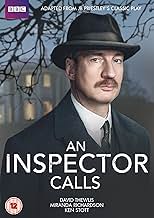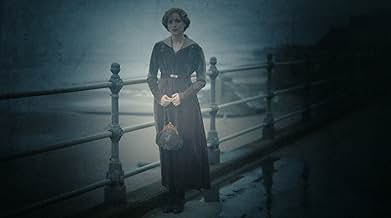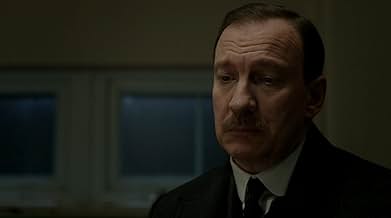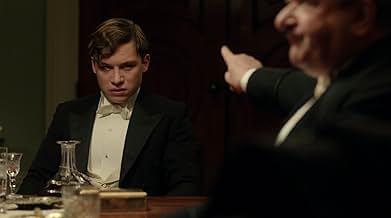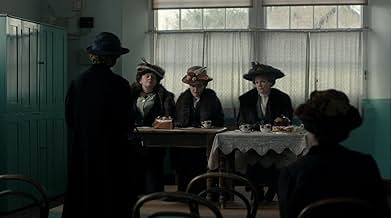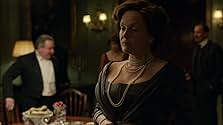Aggiungi una trama nella tua linguaA mysterious inspector investigates the wealthy Birling family and their dinner guest following the suicide of a young woman.A mysterious inspector investigates the wealthy Birling family and their dinner guest following the suicide of a young woman.A mysterious inspector investigates the wealthy Birling family and their dinner guest following the suicide of a young woman.
- Regia
- Sceneggiatura
- Star
- Premi
- 2 vittorie e 5 candidature totali
- Gate Keeper
- (non citato nei titoli originali)
- Posh Lady
- (non citato nei titoli originali)
- Millward's Shop Customer
- (non citato nei titoli originali)
- Young Eva
- (non citato nei titoli originali)
- …
- Factory Worker
- (non citato nei titoli originali)
- …
- seaside Photographer
- (non citato nei titoli originali)
- Factory Worker
- (non citato nei titoli originali)
Recensioni in evidenza
I can't compare (as yet) with the original version, but the 2015 version is very well, with good period atmosphere.
"An inspector calls" is based on the play of the same name by J.B. Priestley (1945). Earlier Priestleys novel "Benighted" (1927) had been adapted by James Whale into the movie "The old dark house" (1932). Both novel and play are comments on the English class society.
The story of "An inspector calls" is about the suicide of a working class girl. During an interrogation by the mysterious inspector Goole (being a group interrogation, this gives the play / film a very Agatha Christie like flavor) it turns out that all of the members of a wealthy family have contributed in one way or another to this suicide.
The story has aged very well. I would like to call attention to a couple of things in particular.
In the beginning of the film the father of the wealthy famlily says "It is not important where you start in life, it is important where you finish". The old American dream phrased differently. His own family is the living proof of the fact that it does matter where you start in life.
Inspector Goole is very mysterious. He seems to be omniscient, interrogating to force a confession and not to learn more himself. He makes a very moralistic farewell speech, in which he says there are thousands of people like the poor working class girl in the story. It is obvious that he is not an ordinary police inspector. It is for the spectator to decide who or what he really is.
The members of the family ar all guilty of the suicide of the girl. There guilt is however ethical and not legal. It is disenchanting to see how quickly some members of the family recuperate when they become aware of this distinction.
Whatever it might be, you're not going to expect *this*. Make absolutely sure to avoid spoilers! All you must know is that it isn't a "detective" story. It's a whodunit of sorts but who did it isn't the point (while being the only point - it'll make sense after)
An inspector calls onto a wealthy family at dinner time in 1910 to impart some seemingly unrelated piece of bad news. Ensues a flawless story, stunning cinematography, perfect period atmosphere, and absolutely top drawer acting. English television at its very best. 10/10 and I'm ever so glad I happened onto this tonight.
Eva Smith does not appear in the Priestley text; in this version she is transformed into a hard-working girl who is not backward about coming forward. Hence she becomes an object of affection for factory-owner Arthur Birling (Ken Stott), his son Eric (Finn Cole), and Gerald Croft (Kyle Soller), the son of a rival factory-owner who is due to be affianced to Arthur's daughter Sheila (Chloe Pirrie). Yet it soon becomes clear that all of them treat her as an object to be picked up and cast aside at will; it's a tribute to Eva's strength of character that she manages to sustain her integrity throughout, until she gives up the ghost and commits suicide.
At the end of the film the floorboards shot is explained, as Eva describes herself as "a crack in the floorboards" - a member of the underclass who is allowed to fall through in a crassly unequal society. No one, it seems, is willing to treat her on her own terms as a human being.
Walsh's version also represents the Inspector (David Thewlis) as a mysterious figure moving slowly in the darkness towards the Birling residence, walking along a narrow slum in shadow, his bowler hat and long coat silhouetted, and visiting the dying Eva in hospital. We are left unsure as to whether he exists at all - especially at the end when he mysteriously disappears. But the question of his being isn't really important: what matters more is his ability to uncover the truth about the Birling family through patient, insistent questioning. Thewlis's expression remains impassive throughout - even if he despises the Birlings' superciliousness, he will never let his emotions get the better of him.
In the central moments of the drama, as the truth about the family was gradually revealed, Walsh used repeated close-ups to focus on the protagonists' changing expressions: Arthur's look of quiet confidence was transformed into an expression of utter despair as he ran his hands through his hair; his wife Sheila (Miranda Richardson) tried her best to retain an impassive exterior, but the tell-tale movements of her cheek and neck-bones betrayed her emotions. Her stoicism in the face of the inevitable truth-revelation was contrasted with Eric's expressions - at first he looked guiltily at everyone in full knowledge that he had been in some way responsible for Eva's death, but as the drama unfolded he acquired a strength of character as he tried to come to terms with his past.
Brilliantly performed and suggestively directed; this was a thoroughly televisual version of the play that reminded us of the persistence of social inequalities today.
Lo sapevi?
- QuizThe original play was produced twice on Broadway over a 50-year period of time. The second production earned multiple awards, including Best Revival of a play, and best featured actress for Jane Adams. The revival production also earned awards for creative set design, which featured all adult actors moving around on an oversized doll house sized set, and the actors were unable to actually enter or move around within the rooms of the house.
- BlooperGerald leaves the room after Sheila has given him back her engagement ring, but the next time she appears, she still has the engagement ring on her finger.
- Citazioni
The Inspector: There are millions and millions of Eva Smiths and John Smiths still left with us, with their lives, their hopes and fears, their suffering and chance of happiness, all intertwined with our lives in what we think and say and do. We don't live alone upon this earth. We are members of one body. We are responsible for each other. And if mankind will not learn that lesson, then the time will, soon, when he will be taught it in fire and blood and anguish.
- ConnessioniRemake of An Inspector Calls (1954)
I più visti
Dettagli
- Data di uscita
- Paese di origine
- Siti ufficiali
- Lingua
- Celebre anche come
- Ha llegado un inspector
- Luoghi delle riprese
- Aziende produttrici
- Vedi altri crediti dell’azienda su IMDbPro
Contribuisci a questa pagina


